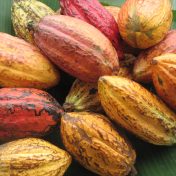“Now, if you haven’t already put the cacao in your mouth, do so now.” I placed the tiny, fragmented bean in my mouth. Unbeknownst to I, the technically edible foodstuff was Mother Nature’s last horcrux, whose apparent mission was to instigate on-sight beef with my fourth sense and leave behind my ravaged taste-buds as casualties of war. My immediate reaction was… Read more »
The use of contemplative practices in a class that focuses on a subject so expansive and with so many interlocking parts that is the global food system at first seemed to me to be a waste of time. To some extent I’m still not convinced by it, but the exercise we did with the raisin was at least an interesting… Read more »
It’s always good to take a step back. There’s so much to think about, we can’t possibly think about it all. Contemplative practices let you zone in on one specific thing and really give it some thought, or think about the connectedness of different things. Food is an especially crazy thing to think about in depth. Where does it come… Read more »
Contemplative practices are used to integrate a student or individual’s holistic personal experience into the context of coursework or learning. With this in mind, not only has it been an important tool in allowing students like myself space to reflect on our involvement in the topics of class, it has also been an innovative approach to placing ourselves and our… Read more »
The world is a fast pace complex place where finding time for self-contemplation is often challenging. This contemplation time is an important part of understanding the world around us. For my first contemplative practice I was skeptical because I had never participated in this type of deeper reflection and engagement before, but it really opened my eyes to the way… Read more »
Working as a barista for four years has made coffee an integral part of my life. I drink up to three cups per day, am knowledgeable about different roasts, and smell like it consistently. However, I haven’t taken the time to explore where coffee beans originate from or how they are processed, even when the information is easily accessible. Instead,… Read more »
In class Professor Litfin committed several days over the past few weeks to contemplative practices— ex. the raisins and the chocolates. Contemplation is something we don’t really think about nowadays in our society. This chance Professor Litfin provided in class was actually something that really spoke out to me. These processed food products are everywhere and are easy to find…. Read more »
In our class, our professor has incorporated so-called “contemplative practices” into our lectures. These are short periods in class wherein we take a moment to slow down and really try to be mindful of ourselves, our surroundings, and the things we are learning. Although I was skeptical at first, I ended up being prove wrong. In particular, there is one… Read more »
Contemplative practices have been an interesting approach to understanding larger food systems. In particular, it has helped me understand food “culture” in America on a much deeper level. Food culture (and generally culture as well) in America is dominated by on the go, fast paced ideals. We want success, a beautiful body, and our good, healthy food and we want… Read more »
A large majority of people within the United States are capable of walking into a grocery store, grabbing what is needed for their dinner that evening, and leaving without consciously considering the impact that food product had on another person’s life. Thinking contemplatively about where our food comes from isn’t a common practice, and if we rarely consider where our… Read more »


